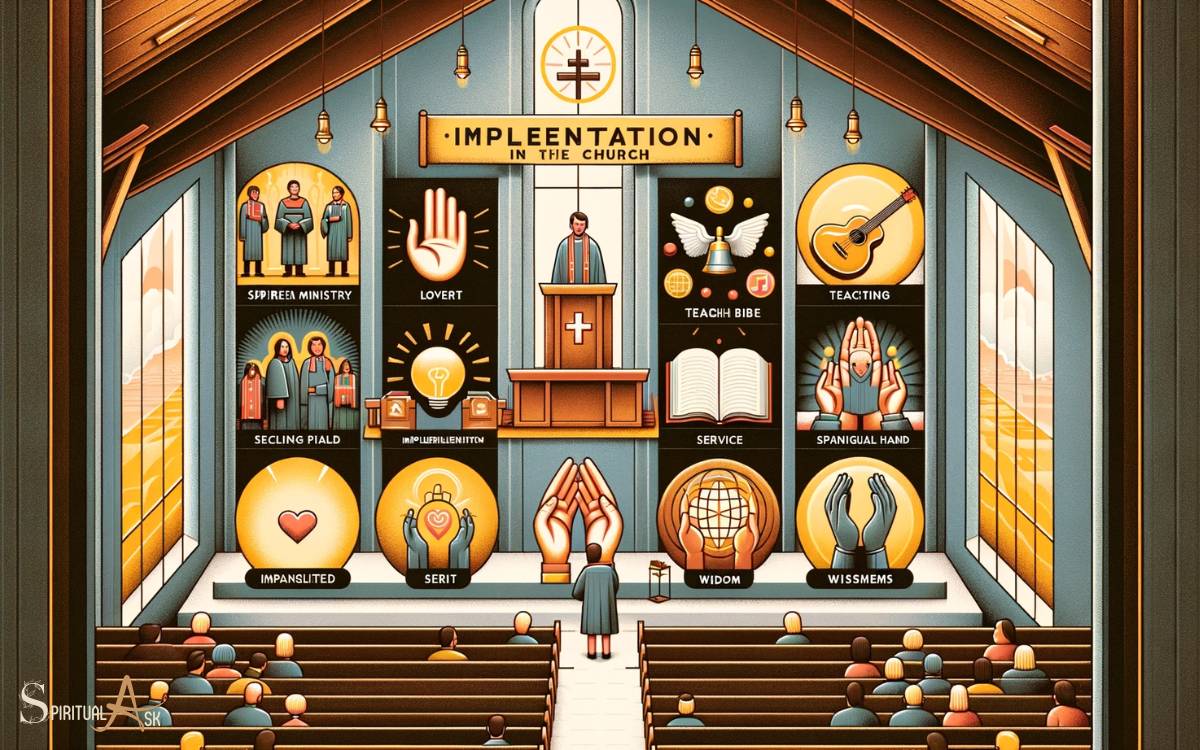Difference Between Five Fold Ministry and Spiritual Gifts!
The Five Fold Ministry and Spiritual Gifts are two distinct components within the Christian framework, each with its unique function.
The Five Fold Ministry refers to the five specific leadership roles described in Ephesians 4:11-13, which include apostles, prophets, evangelists, pastors, and teachers. These roles are designated to prepare God’s people for works of service and to build up the church.
In contrast, Spiritual Gifts are the special abilities granted by the Holy Spirit to all believers to contribute to the functioning of the church, as detailed in passages like 1 Corinthians 12 and Romans 12.
- Five Fold Ministry:
- Spiritual Gifts:
Example: A pastor (Five Fold Ministry) might have the spiritual gift of teaching, which they use to educate and guide the congregation.
Understanding the Five Fold Ministry and Spiritual Gifts clarifies our roles in God’s plan for the church.

Key Takeaway
Difference Between Five Fold Ministry and Spiritual Gifts
| Five-Fold Ministry | Spiritual Gifts |
|---|---|
| Apostle | Wisdom, Leadership |
| Prophet | Knowledge, Prophecy, Discerning of Spirits |
| Evangelist | Faith, Evangelism |
| Pastor | Healing, Mercy, Encouragement |
| Teacher | Miracles, Teaching, Administration, Giving |
Biblical Basis
While the biblical basis for the five-fold ministry and spiritual gifts is rooted in the New Testament, it is essential to differentiate between their functions and manifestations.

The five-fold ministry, outlined in Ephesians 4:11-12, consists of apostles, prophets, evangelists, pastors, and teachers, and is designed to equip and build up the body of Christ.
These roles are more permanent and leadership-oriented, intended for the ongoing guidance and edification of the church.
On the other hand, spiritual gifts, as described in 1 Corinthians 12:7-11, are diverse and include gifts of wisdom, knowledge, faith, healing, miracles, prophecy, discernment, tongues, and interpretation of tongues.
These gifts are distributed by the Holy Spirit as He wills and are for the benefit of the entire body of believers. Understanding these distinctions is crucial for effectively operating within the framework of the church and serving others faithfully.
Purpose and Function
The purpose and function of the five-fold ministry and spiritual gifts are distinct yet complementary within the framework of the church.

The five-fold ministry, as outlined in Ephesians 4:11-12, serves to equip and build up the body of Christ, fostering unity and maturity.
On the other hand, spiritual gifts, delineated in 1 Corinthians 12:7, are manifestations of the Spirit for the common good, serving the specific needs of the church.
| Five-Fold Ministry | Spiritual Gifts |
|---|---|
| Apostle – Pioneer and establish new works | Word of Wisdom – Ability to make decisions and give guidance |
| Prophet – Speak forth the mind and counsel of God | Faith – Trust in God’s provision and protection |
| Evangelist – Proclaim the gospel and win souls | Healing – Restoration of health and wholeness |
| Pastor – Shepherd and care for the flock | Miracles – Supernatural interventions |
| Teacher – Instruct and ground believers in the truth | Prophecy – Speaking forth God’s heart and intentions |
Understanding the distinct roles and functions of both the five-fold ministry and spiritual gifts enables the church to operate effectively, edifying and empowering its members for the work of ministry.
Leadership Roles
Alright, let’s talk about leadership roles within the context of the five-fold ministry and spiritual gifts. It’s important to understand the distinct roles and responsibilities within the church, as well as the biblical structure for leadership.

Additionally, we’ll explore how these leadership roles intersect with and differ from various ministry gifts.
Roles in Church
As I explore the difference between the five-fold ministry and spiritual gifts, it is important to understand the various leadership roles within the church. These roles are crucial for the functioning and growth of a healthy church community.
Here is a table outlining some common leadership roles in the church:
| Leadership Role | Description | Scripture Reference |
|---|---|---|
| Pastor | Provides spiritual guidance and leadership | Ephesians 4:11, 1 Timothy 3 |
| Elder | Offers wisdom, oversight, and care for the church | 1 Timothy 3, Titus 1 |
| Deacon | Serves the practical and administrative needs | Acts 6:1-7, 1 Timothy 3 |
| Teacher | Instructs and educates the congregation | 1 Corinthians 12:28, Ephesians 4:11 |
| Evangelist | Shares the Gospel and leads others to Christ | Ephesians 4:11, 2 Timothy 4:5 |
Understanding these roles can help individuals identify their own giftings and find their place within the church community.
Biblical Leadership Structure
Exploring the biblical leadership structure in the church reveals the various roles and responsibilities that contribute to its functioning and growth. Within the biblical framework, there are distinct leadership roles such as pastors, elders, deacons, and teachers.
Pastors are responsible for the spiritual care and guidance of the church, providing leadership and support to the congregation. Elders are tasked with providing wise counsel, spiritual oversight, and decision-making within the church community.
Deacons serve the practical and administrative needs of the church, ensuring that the daily operations run smoothly. Teachers are responsible for imparting biblical knowledge and spiritual understanding to the members of the church.
Each of these roles plays a crucial part in fostering a healthy and thriving church community, working together to fulfill the mission and vision of the church.
Ministry Gifts Distinction
Discussing the distinction between ministry gifts and leadership roles brings clarity to their respective functions within the church.
Ministry gifts are the specific abilities and roles given to individuals by the Holy Spirit to serve the body of Christ, while leadership roles are the positions of responsibility within the church that involve overseeing, guiding, and directing the congregation.
To better illustrate this, let’s consider the following table:
| Ministry Gift | Description | Leadership Role |
|---|---|---|
| Apostle | Planting and overseeing churches | Senior Pastor |
| Prophet | Speaking forth the word of God | Head Elder |
| Evangelist | Spreading the gospel and winning souls | Outreach Director |
| Pastor | Nurturing and shepherding the flock | Associate Pastor |
| Teacher | Instructing and grounding believers | Education Director |
Understanding the differences between ministry gifts and leadership roles helps to ensure that the right individuals are placed in the appropriate positions for the effective functioning of the church.
Diversity of Gifts
I’ll start by highlighting the various types of spiritual gifts and their significance in the church. Then, I’ll explore the purpose of diverse gifts and how they contribute to the overall mission and function of the body of believers.

Finally, I’ll discuss the unity that can be achieved through embracing and utilizing the diversity of gifts within the church community.
Types of Spiritual Gifts
One significant aspect of the diversity of spiritual gifts is the wide range of abilities and functions they encompass. Spiritual gifts are varied and are given to individuals to serve others and build up the body of believers.
Here are some examples of spiritual gifts:
| Gift | Description |
|---|---|
| Prophecy | Speaking truth and guidance from God |
| Serving | Assisting and helping others |
| Teaching | Explaining and sharing knowledge |
| Encouragement | Providing support and motivation |
| Giving | Generously offering time and resources |
These gifts are just a few examples of the diverse abilities provided by the Holy Spirit.
Understanding the different types of spiritual gifts helps us appreciate the unique contributions each person can make within the community of faith. Moving forward, it’s important to explore the purpose of these diverse gifts.
Purpose of Diverse Gifts
Continuing from our previous discussion of the types of spiritual gifts, it is essential to understand the purpose of the diverse gifts bestowed upon believers.
The diverse gifts, such as leadership, teaching, and mercy, are given to equip and edify the body of believers, fostering growth and unity within the church.
These gifts are not meant for personal gain but rather for the common good, serving as a means to demonstrate God’s love and grace to others.
Each believer’s unique gifts complement the abilities of others, creating a harmonious and balanced community where all members are valued and essential.
Embracing the diversity of gifts allows for a more comprehensive expression of God’s character and enhances the effectiveness of the church in fulfilling its mission. When we recognize and celebrate the various spiritual gifts in worship, we create a space where everyone can contribute and feel valued. This not only leads to a more vibrant and dynamic worship experience, but also strengthens the unity and cohesion of the church community. By embracing and utilizing the diversity of spiritual gifts, we can fully reflect the image of God and effectively share the love of Christ with the world.
Understanding the purpose of diverse gifts enables believers to appreciate the value of each individual contribution, promoting unity and cooperation within the body of Christ. This leads us to explore the concept of ‘unity in gift diversity’.
Unity in Gift Diversity
Frequently, my understanding of the unity in gift diversity emphasizes the importance of recognizing and valuing the diverse gifts within the body of believers.
This unity is not about conformity, but rather about appreciating the unique contributions each individual brings to the community. When we embrace gift diversity, we foster an environment where everyone feels valued and included.
Unity in gift diversity also allows for a more comprehensive representation of God’s character and purposes. It enables us to serve each other more effectively by drawing on a wide range of strengths and abilities.
Embracing diverse gifts promotes a sense of belonging and encourages the development of a strong, unified community. Ultimately, it allows us to fulfill our collective mission more effectively and bring glory to God.
Training and Equipping
As I delve into the concept of training and equipping within the context of the difference between the five-fold ministry and spiritual gifts, it is essential to understand the distinct roles and functions associated with each aspect.

The five-fold ministry focuses on equipping and training individuals for specific leadership roles within the church, such as apostles, prophets, evangelists, pastors, and teachers.
This training involves mentorship, teaching, and practical experience to develop these leaders into effective shepherds and ministers.
On the other hand, spiritual gifts encompass a broader range of abilities given to every believer for the edification of the church.
While training and equipping are crucial for both the five-fold ministry and spiritual gifts, they serve different purposes within the church body, ultimately working together for the common good and growth of the church.
Implementation in the Church

I have observed a significant implementation of both the five-fold ministry and spiritual gifts within the church.
This has been achieved through:
- Teaching and Training: The church has been intentional about equipping its members with the knowledge and understanding of the five-fold ministry and spiritual gifts. This has led to the identification and nurturing of individuals who exhibit these gifts.
- Integration into Leadership: The church has made a conscious effort to integrate the five-fold ministry into its leadership structure. Apostles, prophets, evangelists, pastors, and teachers are recognized and given roles that align with their giftings.
- Encouragement of Spiritual Gifts: The church environment fosters the expression of spiritual gifts. Members are encouraged to operate in their gifts, and there is a culture of support and validation for these manifestations.
This intentional implementation has resulted in a thriving community where the diverse gifts and ministries work together for the edification and growth of the church.
Can you explain the differences between the Five Fold Ministry and Ministry Gifts in relation to Spiritual Gifts?
The difference between spiritual gifts and the concepts of the Five Fold Ministry and Ministry Gifts lies in their roles and purposes within the Christian context. Spiritual gifts are special abilities given by the Holy Spirit to believers for the purpose of building up the body of Christ.
The Five Fold Ministry and Ministry Gifts, however, refer to specific roles and functions within the church.
- Five Fold Ministry: Identified in Ephesians 4:11-12, it includes apostles, prophets, evangelists, pastors, and teachers. These roles are designed to equip believers for ministry and build up the church.
- Ministry Gifts: Found in Romans 12 and 1 Corinthians 12, these include a broader range of gifts such as healing, miracles, prophecy, speaking in tongues, and interpretation of tongues, among others. They are given to individual believers for the common good.
The key differences are:
- Scope and Function: The Five Fold Ministry focuses on leadership and equipping roles, while Ministry Gifts are diverse abilities distributed among believers.
- Purpose: Both aim to edify the church but do so through different mechanisms—leadership and direct service versus supernatural empowerment for various tasks.
In essence, while both the Five Fold Ministry and Ministry Gifts originate from the same Spirit, they serve complementary yet distinct purposes in the spiritual growth and operational dynamics of the church.
Impact on the Body of Believers

Having observed the significant implementation of both the five-fold ministry and spiritual gifts within the church, it is evident that the impact on the body of believers is profound and transformative.
The table below illustrates the distinct impact of these two elements on the body of believers:
| Five-Fold Ministry | Spiritual Gifts |
|---|---|
| Equips and empowers believers for ministry | Enables believers to serve effectively |
| Provides leadership and guidance | Enhances the functioning of the body |
| Fosters unity and growth | Manifests God’s power and presence |
| Facilitates discipleship and maturity | Brings about edification and encouragement |
| Strengthens and builds the church | Demonstrates God’s love and care |
Understanding the impact of both the five-fold ministry and spiritual gifts is vital for the holistic growth and effectiveness of the body of believers.
Conclusion
Just as a beautiful bouquet of flowers is made up of different types and colors, the five-fold ministry and spiritual gifts work together to bring diversity and beauty to the body of believers.
Each member plays a unique role, like a different flower in the bouquet, creating a harmonious and impactful display of God’s love and power. Embracing and utilizing both the five-fold ministry and spiritual gifts is essential for a thriving and vibrant church community.






